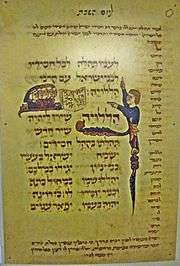Psalm 149

Psalm 149 is the 149th psalm of the Book of psalms.
Uses
Judaism
- Psalm 149 is recited in its entirety in Pesukei Dezimra.[1]
Catholicism
It is one of the Laudate psalms and was sung as part of a trio of psalms during Lauds in the Roman rite.
With Psalm 148 and Psalm 150, Psalm was recited or sung daily during the solemn service of matins,[2] according to the Rule of St. Benedict(530AD.[3] In the Liturgy of the Hours, there is Psalm 149 service for Sunday Lauds in the first semaine.[4] It is also used for feasts and solemnities week. In the Eucharistic liturgy, it is the Saturday after the Epiphany or before January 7 epiphany, and at Easter, the Monday of the sixth week.
Musical settings
Heinrich Schütz published a composition of its beginning in 1625 in his Cantiones sacrae as SWV 81, scored for four voices and basso continuo.
References
- ↑ The Complete Artscroll Siddur pages 72-74
- ↑ Psautier latin-français du bréviaire monastique, p. 124, 185, 228, 275, 328, 378 & 433
- ↑ Règle de saint Benoît, chapitres XII et XIII, traduction par Prosper Guéranger, (Abbaye Saint-Pierre de Solesmes, réimpression 2007) p40-41.
- ↑ Le cycle principal des prières liturgiques se déroule sur quatre semaines.
External links
-
 Works related to Psalm 149 at Wikisource
Works related to Psalm 149 at Wikisource
This article is issued from Wikipedia - version of the 6/28/2016. The text is available under the Creative Commons Attribution/Share Alike but additional terms may apply for the media files.